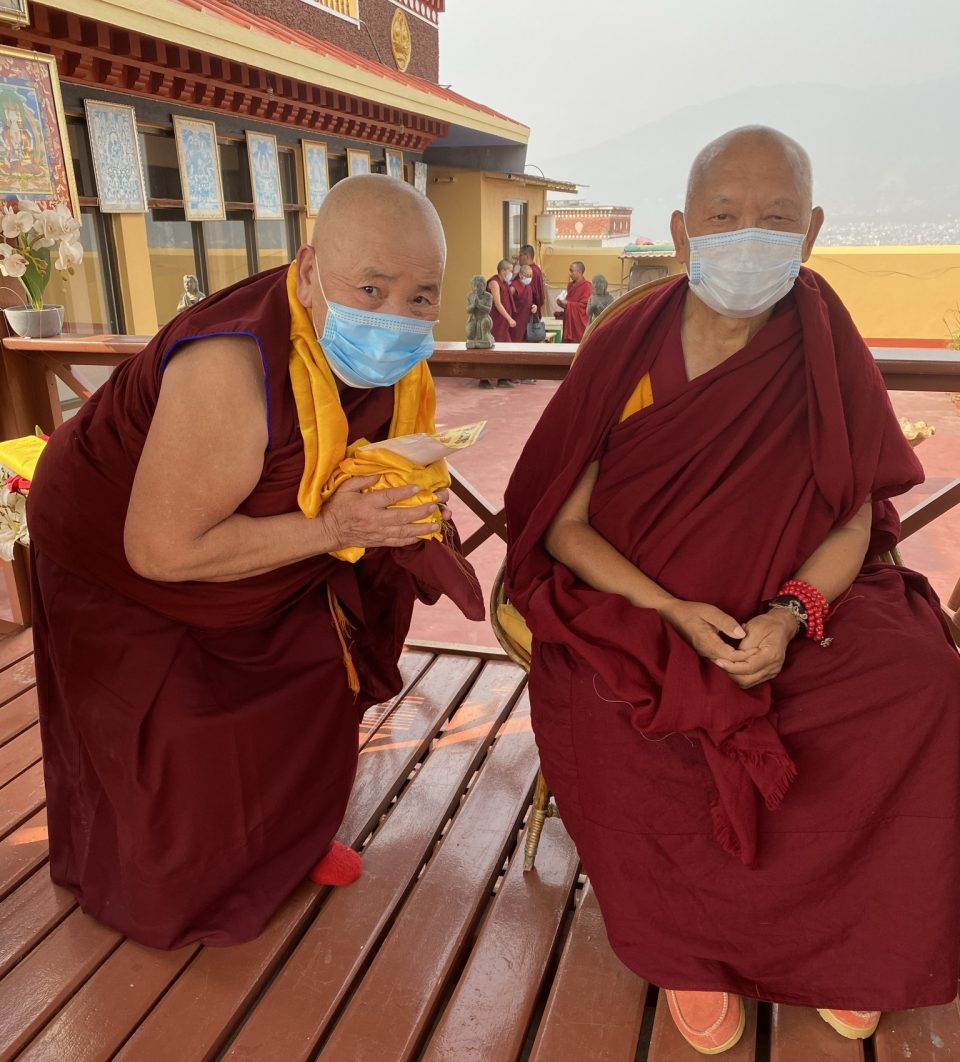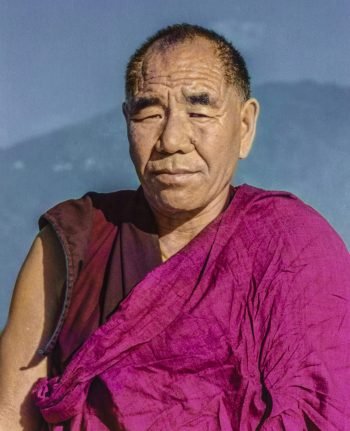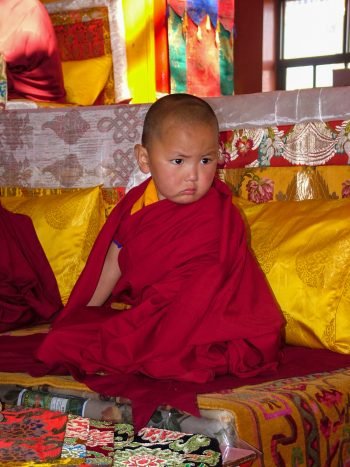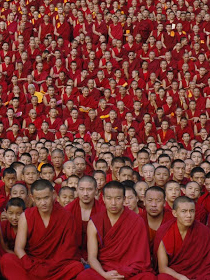- Home
- FPMT Homepage
Foundation for the Preservation of the Mahayana Tradition
The FPMT is an organization devoted to preserving and spreading Mahayana Buddhism worldwide by creating opportunities to listen, reflect, meditate, practice and actualize the unmistaken teachings of the Buddha and based on that experience spreading the Dharma to sentient beings. We provide integrated education through which people’s minds and hearts can be transformed into their highest potential for the benefit of others, inspired by an attitude of universal responsibility and service. We are committed to creating harmonious environments and helping all beings develop their full potential of infinite wisdom and compassion. Our organization is based on the Buddhist tradition of Lama Tsongkhapa of Tibet as taught to us by our founders Lama Thubten Yeshe and Lama Thubten Zopa Rinpoche.
- Willkommen
Die Stiftung zur Erhaltung der Mahayana Tradition (FPMT) ist eine Organisation, die sich weltweit für die Erhaltung und Verbreitung des Mahayana-Buddhismus einsetzt, indem sie Möglichkeiten schafft, den makellosen Lehren des Buddha zuzuhören, über sie zur reflektieren und zu meditieren und auf der Grundlage dieser Erfahrung das Dharma unter den Lebewesen zu verbreiten.
Wir bieten integrierte Schulungswege an, durch denen der Geist und das Herz der Menschen in ihr höchstes Potential verwandelt werden zum Wohl der anderen – inspiriert durch eine Haltung der universellen Verantwortung und dem Wunsch zu dienen. Wir haben uns verpflichtet, harmonische Umgebungen zu schaffen und allen Wesen zu helfen, ihr volles Potenzial unendlicher Weisheit und grenzenlosen Mitgefühls zu verwirklichen.
Unsere Organisation basiert auf der buddhistischen Tradition von Lama Tsongkhapa von Tibet, so wie sie uns von unseren Gründern Lama Thubten Yeshe und Lama Thubten Zopa Rinpoche gelehrt wird.
- Bienvenidos
La Fundación para la preservación de la tradición Mahayana (FPMT) es una organización que se dedica a preservar y difundir el budismo Mahayana en todo el mundo, creando oportunidades para escuchar, reflexionar, meditar, practicar y actualizar las enseñanzas inconfundibles de Buda y en base a esa experiencia difundir el Dharma a los seres.
Proporcionamos una educación integrada a través de la cual las mentes y los corazones de las personas se pueden transformar en su mayor potencial para el beneficio de los demás, inspirados por una actitud de responsabilidad y servicio universales. Estamos comprometidos a crear ambientes armoniosos y ayudar a todos los seres a desarrollar todo su potencial de infinita sabiduría y compasión.
Nuestra organización se basa en la tradición budista de Lama Tsongkhapa del Tíbet como nos lo enseñaron nuestros fundadores Lama Thubten Yeshe y Lama Zopa Rinpoche.
A continuación puede ver una lista de los centros y sus páginas web en su lengua preferida.
- Bienvenue
L’organisation de la FPMT a pour vocation la préservation et la diffusion du bouddhisme du mahayana dans le monde entier. Elle offre l’opportunité d’écouter, de réfléchir, de méditer, de pratiquer et de réaliser les enseignements excellents du Bouddha, pour ensuite transmettre le Dharma à tous les êtres. Nous proposons une formation intégrée grâce à laquelle le cœur et l’esprit de chacun peuvent accomplir leur potentiel le plus élevé pour le bien d’autrui, inspirés par le sens du service et une responsabilité universelle. Nous nous engageons à créer un environnement harmonieux et à aider tous les êtres à épanouir leur potentiel illimité de compassion et de sagesse. Notre organisation s’appuie sur la tradition guéloukpa de Lama Tsongkhapa du Tibet, telle qu’elle a été enseignée par nos fondateurs Lama Thoubtèn Yéshé et Lama Zopa Rinpoché.
Visitez le site de notre Editions Mahayana pour les traductions, conseils et nouvelles du Bureau international en français.
Voici une liste de centres et de leurs sites dans votre langue préférée
- Benvenuto
L’FPMT è un organizzazione il cui scopo è preservare e diffondere il Buddhismo Mahayana nel mondo, creando occasioni di ascolto, riflessione, meditazione e pratica dei perfetti insegnamenti del Buddha, al fine di attualizzare e diffondere il Dharma fra tutti gli esseri senzienti.
Offriamo un’educazione integrata, che può trasformare la mente e i cuori delle persone nel loro massimo potenziale, per il beneficio di tutti gli esseri, ispirati da un’attitudine di responsabilità universale e di servizio.
Il nostro obiettivo è quello di creare contesti armoniosi e aiutare tutti gli esseri a sviluppare in modo completo le proprie potenzialità di infinita saggezza e compassione.
La nostra organizzazione si basa sulla tradizione buddhista di Lama Tsongkhapa del Tibet, così come ci è stata insegnata dai nostri fondatori Lama Thubten Yeshe e Lama Zopa Rinpoche.
Di seguito potete trovare un elenco dei centri e dei loro siti nella lingua da voi prescelta.
- 欢迎 / 歡迎
简体中文
“护持大乘法脉基金会”( 英文简称:FPMT。全名:Foundation for the Preservation of the Mahayana Tradition) 是一个致力于护持和弘扬大乘佛法的国际佛教组织。我们提供听闻,思维,禅修,修行和实证佛陀无误教法的机会,以便让一切众生都能够享受佛法的指引和滋润。
我们全力创造和谐融洽的环境, 为人们提供解行并重的完整佛法教育,以便启发内在的环宇悲心及责任心,并开发内心所蕴藏的巨大潜能 — 无限的智慧与悲心 — 以便利益和服务一切有情。
FPMT的创办人是图腾耶喜喇嘛和喇嘛梭巴仁波切。我们所修习的是由两位上师所教导的,西藏喀巴大师的佛法传承。
繁體中文
護持大乘法脈基金會”( 英文簡稱:FPMT。全名:Found
ation for the Preservation of the Mahayana Tradition ) 是一個致力於護持和弘揚大乘佛法的國際佛教組織。我們提供聽聞, 思維,禪修,修行和實證佛陀無誤教法的機會,以便讓一切眾生都能 夠享受佛法的指引和滋潤。 我們全力創造和諧融洽的環境,
為人們提供解行並重的完整佛法教育,以便啟發內在的環宇悲心及責 任心,並開發內心所蘊藏的巨大潛能 — 無限的智慧與悲心 – – 以便利益和服務一切有情。 FPMT的創辦人是圖騰耶喜喇嘛和喇嘛梭巴仁波切。
我們所修習的是由兩位上師所教導的,西藏喀巴大師的佛法傳承。 察看道场信息:
- FPMT Homepage
- News/Media
-
- Study & Practice
-
-
- About FPMT Education Services
- Latest News
- Programs
- New to Buddhism?
- Buddhist Mind Science: Activating Your Potential
- Heart Advice for Death and Dying
- Discovering Buddhism
- Living in the Path
- Exploring Buddhism
- FPMT Basic Program
- FPMT Masters Program
- FPMT In-Depth Meditation Training
- Maitripa College
- Lotsawa Rinchen Zangpo Translator Program
- Universal Education for Compassion & Wisdom
- Online Learning Center
-
- Prayers & Practice Materials
- Overview of Prayers & Practices
- Full Catalogue of Prayers & Practice Materials
- Explore Popular Topics
- Benefiting Animals
- Chenrezig Resources
- Death & Dying Resources
- Lama Chopa (Guru Puja)
- Lama Zopa Rinpoche: Compendium of Precious Instructions
- Lama Zopa Rinpoche: Life Practice Advice
- Lama Zopa Rinpoche Practice Series
- Lamrim Resources
- Mantras
- Prayer Book Updates
- Purification Practices
- Sutras
- Thought Transformation (Lojong)
- Audio Materials
- Dharma Dates - Tibetan Calendar
- Translation Services
- Publishing Services
- Ways to Offer Support
- Prayers & Practice Materials
-
- Teachings and Advice
- Find Teachings and Advice
- Lama Zopa Rinpoche Advice Page
- Lama Zopa Rinpoche: Compendium of Precious Instructions
- Lama Zopa Rinpoche Video Teachings
- ༧སྐྱབས་རྗེ་བཟོད་པ་རིན་པོ་ཆེ་མཆོག་ནས་སྩལ་བའི་བཀའ་སློབ་བརྙན་འཕྲིན།
- Podcasts
- Lama Yeshe Wisdom Archive
- Buddhism FAQ
- Dharma for Young People
- Resources on Holy Objects
- Teachings and Advice
-
-
*If a menu item has a submenu clicking once will expand the menu clicking twice will open the page.
-
-
- Centers
-
- Teachers
-
- Projects
-
-
-
-
*If a menu item has a submenu clicking once will expand the menu clicking twice will open the page.
-
-
- FPMT
-
- Shop
-
-
-
The Foundation Store is FPMT’s online shop and features a vast selection of Buddhist study and practice materials written or recommended by our lineage gurus. These items include homestudy programs, prayers and practices in PDF or eBook format, materials for children, and other resources to support practitioners.
Items displayed in the shop are made available for Dharma practice and educational purposes, and never for the purpose of profiting from their sale. Please read FPMT Foundation Store Policy Regarding Dharma Items for more information.
-
-
14

Lama Rinpoche with Ani Chodron at Kopan Nunnery, 2021. Photo by Ven. Roger Kunsang.
Venerable Ani Chodron was born in the year of the wood bird in 1945 in the village of Tsum near the border of Tibet in northeast Nepal. She is the oldest of four children, all daughters, born to Mingmar Tshok and Mingma Tsewang. Her parents were nomads and farmers, and her uncle Gelong Pasang Tsering was known as the chanting master of Mu-Gompa.
At the age of nine, Ani Chodron ordained at Ranchen Nunnery. She received from His Holiness the previous Chosang Rinpoche the great initiations of Avalokiteshvara, Yamantaka, and Vajrayogini. When her uncle retired from Mu-Gompa to enter retreat in a nearby cave, the senior monks and nuns chose Ani Chodron to be his assistant. There she performed one hundred thousand each of mandala offerings, prostrations, guru yoga recitations, and long mantras of Vajrasattva.

Geshe Lama Konchog at Kopan Monastery, 1985. Photo courtesy of Lama Yeshe Wisdom Archive.
In 1959, Geshe Lama Konchog escaped Tibet via a route revealed to him in a dream which led him across the border to the village of Tsum. After many years meditating in solitude in a cave of Milarepa, he settled in a cave about an hour outside of Tsum known as Gaden Gompa.
Ani Chodron remembers when she heard the great mahasiddha Geshe Lama Konchog had moved to a nearby cave. She joined her uncle, three nuns from Ranchen Nunnery, and seven monks from Mu-Gompa to pay their respects and request teachings. The group received from Geshe Lama Konchog profound instruction and were led in a great Vajrayogini retreat. Together they performed four hundred thousand mantra recitations.
When Ani Chodron’s mother died at the age of 39, she moved home to the village in Tsum to help her family. After some time, Geshe Lama Konchog paid the family a visit. He advised the family to arrange a marriage for Ani Chodron’s younger sister so that Ani Chodron could continue her retreat. The family agreed, and Geshe Lama Konchog chose a husband for Ani Chodron’s younger sister, Ami Bhuti. In 1975, in the village of Tsum, Ami Bhuti gave birth to Tenzin Zopa, now Geshe Tenzin Zopa, an FPMT teacher.
Ani Chodron’s first nyung na retreat was led by Geshe Lama Konchog. The intense purification practice is highly praised by Lama Zopa Rinpoche as a supreme method for transforming the mind. Nyung na involves fasting, meditation, prostrations, mantra recitations, and taking Mahayana precepts each day. In Geshe Lama Konchog’s commentary on nyung na he said, “You should work hard. I have already completed 2,000 sets of nyung na retreats.”
At times the conditions in the cave were so poor it tested Ani Chodron’s faith as to whether she would be able to complete the nyung na retreats. For many years, she would go down to the village to beg for tsampa, rice, fruit, or any food at all just to be able to survive the retreats in the cave. Whenever she questioned whether she had the strength to continue, she recalled Geshe Lama Konchog’s words in order to fortify her resolve. Incredibly, in the end, Ani Chodron was also able to complete 2,000 nyung na retreats.
Over the years, Geshe Lama Konchog became a beloved figure in Tsum village. Ani Chodron’s nephew spent so much time at Geshe Lama Konchog’s feet that as a little boy Tenzin Zopa assumed he was his grandfather. Geshe Lama Konchog taught the local ordained and lay community, and every year he would lead a nyung na retreat that included both villagers and Sangha.

Tenzin Phuntsok Rinpoche, the recognized reincarnation of Geshe Lama Konchog. Nepal, 2006. Photo by Ven. Roger Kunsang.
Ani Chodron did retreats with Geshe Lama Konchog in the summer and traveled with him to India in the winter to attend teachings from His Holiness the Dalai Lama. The walk from Tsum to Kathmandu took sixteen days. In Kathmandu they stayed in Thamel at Katasyambu because they had no money. They would sell Tibetan incense and share what they collected. It took two days of walking non-stop day and night to reach the border of India. In India they received from His Holiness the Dalia Lama initiations for Kalachakra, Yamantaka, Avalokiteshvara, and Vajrayogini. His Holiness also gave teachings on the Bodhisattva’s Way of Life. Each time she returned to Tsum she continued to receive Dharma teachings at Gaden Gompa.
On October 15, 2001 the great mahasiddha Geshe Lama Konchog passed away at the age of 84. Ani Chodron’s nephew Tenzin Zopa had long-since been ordained as a monk and become a devoted disciple of Geshe Lama Konchog. He presided over the ceremonies and funeral for his precious guru at Kopan Monastery in Nepal.
In 2006, Ani Chodron came to Kopan Monastery to take care of Tenzin Phuntsok Rinpoche, the recognized reincarnation of Geshe Lama Konchog. She had no hesitation and only joy at being given the opportunity to serve because, as she explains, she understood the power of the opportunity provided for her to purify her negative karma and to accumulate merit. At Kopan, she received many Dharma teachings from Lama Zopa Rinpoche. Ani Chodron credits any progress in her practice and on her path to following the guidance of her holy gurus.
This remarkable nun has simple advice for her dear Dharma brothers and sisters, “I only have a humble request [for] you to follow wholeheartedly the advice of His Holiness the Dalai Lama and Guru Kyabje Lama Thubten Zopa Rinpoche.”
This article was written by Heather Melton Fox based on an interview with Ani Chodron. Thanks to Ngudrup Tsering for translation of this interview. Edited for publication by Carina Rumrill.
If you are inspired to support people undertaking retreats like what you have read about here, please consider offering to the Practice and Retreat Fund which provides grants and sponsorships to students engaged in retreats such as 108 nyung na retreats, 100 million mani retreats, recitations of sutras, and long-term retreat.
If you are interested in learning more about the practice of nyung na, you can find many resources in the Foundation Store.
- Home
- News/Media
- Study & Practice
- About FPMT Education Services
- Latest News
- Programs
- New to Buddhism?
- Buddhist Mind Science: Activating Your Potential
- Heart Advice for Death and Dying
- Discovering Buddhism
- Living in the Path
- Exploring Buddhism
- FPMT Basic Program
- FPMT Masters Program
- FPMT In-Depth Meditation Training
- Maitripa College
- Lotsawa Rinchen Zangpo Translator Program
- Universal Education for Compassion & Wisdom
- Online Learning Center
- Prayers & Practice Materials
- Overview of Prayers & Practices
- Full Catalogue of Prayers & Practice Materials
- Explore Popular Topics
- Benefiting Animals
- Chenrezig Resources
- Death & Dying Resources
- Lama Chopa (Guru Puja)
- Lama Zopa Rinpoche: Compendium of Precious Instructions
- Lama Zopa Rinpoche: Life Practice Advice
- Lama Zopa Rinpoche Practice Series
- Lamrim Resources
- Mantras
- Prayer Book Updates
- Purification Practices
- Sutras
- Thought Transformation (Lojong)
- Audio Materials
- Dharma Dates – Tibetan Calendar
- Translation Services
- Publishing Services
- Teachings and Advice
- Find Teachings and Advice
- Lama Zopa Rinpoche Advice Page
- Lama Zopa Rinpoche: Compendium of Precious Instructions
- Lama Zopa Rinpoche Video Teachings
- ༧སྐྱབས་རྗེ་བཟོད་པ་རིན་པོ་ཆེ་མཆོག་ནས་སྩལ་བའི་བཀའ་སློབ་བརྙན་འཕྲིན།
- Podcasts
- Lama Yeshe Wisdom Archive
- Buddhism FAQ
- Dharma for Young People
- Resources on Holy Objects
- Ways to Offer Support
- Centers
- Affiliates Area
- Teachers
- Projects
- Charitable Projects
- Make a Donation
- Applying for Grants
- News about Projects
- Other Projects within FPMT
- Support International Office
- Projects Photo Galleries
- Give Where Most Needed
- FPMT
- Shop
Translate*
*powered by Google TranslateTranslation of pages on fpmt.org is performed by Google Translate, a third party service which FPMT has no control over. The service provides automated computer translations that are only an approximation of the websites' original content. The translations should not be considered exact and only used as a rough guide.When Lord Buddha spoke about suffering, he wasn’t referring simply to superficial problems like illness and injury, but to the fact that the dissatisfied nature of the mind itself is suffering.








